Single-Edged Swords: The Deadliest Slashing Weapons

What’s in this article?
A single-edged sword is a bladed weapon that only has one side of its blade sharpened for battle. In history, these types of swords were very common, and they do have their fair share of benefits.
In this article, we will discuss every aspect of single-edged swords. You’’ learn about the ones most popular and effective swords that were used in the past. Lastly, we shall go over their defining characteristics and how they compare when put up against a double-edged sword.
Katana
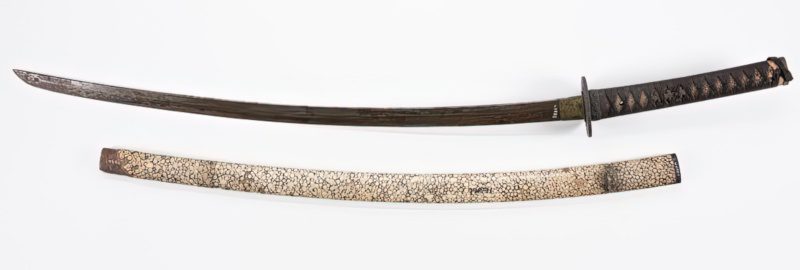
The most famous sword with a single edge is the Japanese sword called the Katana. This Samurai sword is known for its high-carbon steel, thanks to the Tamahagane metal it’s crafted from. The Katana is said to be one of the deadliest swords in the world.
There are many Katana-like weapons from the Japanese arsenal of swords that can also be considered the deadliest. Firstly, the Nagamaki comes to mind, then the big Odachi, the smaller Wakizashi, and so on. They all have single-edged blades that are meant to be used for slashing and thrusting with the tip.
Whenever a Katana’s sharpness was tested, it’s said that a rifle was fired at the blade, and the bullet would often be split in two with minimal damage to the sword. The usual length of a Katana sword is around 39 inches long (100 cm).
Dao

Dao swords are one of the most famous single-edged bladed weapons that come from China. The slightly curved Dao sword is called the General of Weapons. On the other hand, the straight Chinese swords, better known as Jian, are called the Gentlemen of Weaponry.
There are many Dao swords that fall into the category of being single-edged. Some of the more popular ones are the MiaoDao, ChangDao, DaDao, YaoDao, LiuyeDao, ZhanMaoDao, and so on. Also, a big part of Korean swords, like the Hwando, have single-edged blades and were influenced by the Chinese Dao swords.
The Chinese Dao usually has a slightly curved blade so it can better support the power that the sharpened blade can exert when swung. Some of them can be used one-handed while some bigger ones, like the ChangDao for example, can be used two-handed as well. They proved deadly in both foot and mounted combat.
The usual length for the Dao single-edged swords can be as small as 23 inches (60 cm) all the way up to a total length of 78 inches long (200 cm)!
Dha

The most popular single-edged sword from the regions of Thailand, Laos, Cambodia, Vietnam, and Yunnas is the Dha. Swords like these were used all over this part of the world and were likely influenced by either Chinese or Japanese swords.
It’s a very small sword which means that one-handed strikes combined with the single sharpened edge would make it a very deadly weapon. It was also used for cutting down tall grass and thick forests to make roads.
The Dha has a very sharp blade that ends with a very pointy tip used for thrusting attacks. The typical size of a Dha is 18 inches (45 cm).
Sabre

While sabres are mainly considered to be single-edged, that’s not always the case. The reason is that many of the sabers are curved and look as though they are single-edged, but on closer inspection, you will find that the last part of the blade’s tip is often double-edged.
A great example of a single-edged saber is the 1767 Briquet sword used in France and throughout the Napoleonic Wars. The Russian Cossack Shashka sword and the Mameluke Sabre are also excellent examples of sabres. Also, a lot of the sabres in the American Civil War were single-edged, but some had a double-edged blade tip.
This made it so that when the user slashes at their opponent, they can quickly strike again using the backside of the sword near the tip to attack again at lightning speed. This technique is often used in modern martial arts that use swords. These single-edged sabers can vary in length, but most of them are around 23 to 39 inches long (60 to 100 cm).
Cutlass

A cutlass is a tight and narrow saber that usually has a wide, curved blade with only one cutting edge. It is a very different type of sabre, mostly because of its small size. Its short length came in handy during sea or naval battles. It was favored by sailors and pirates alike around the world.
The typical standard length of a single-edged Cutlass was around 27 inches (70 cm).
Scimitar
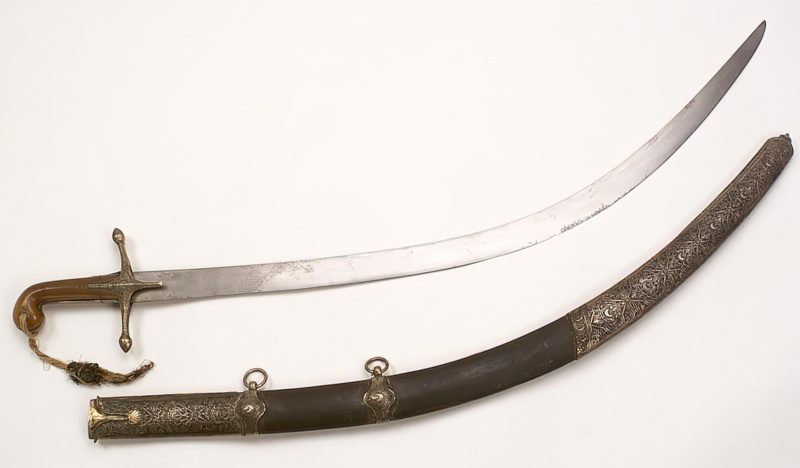
Scimitars are swords that are curved and often linked to the Middle East with a strong Islamic influence. The curve is said to represent the moon or the crescent. While they were heavily used in the Middle East, these scimitars most likely came from the nomadic Turkic-Mongol steppe peoples.
The Scimitar family has very unique types of single-edged swords that almost always have a strong curve in the blade. The most recognizable are the Persian Shamshir, the Pulwar from Afghanistan, Nimcha from Morocco, Talward from India, and the Kilij from Turkey.
Some of the Scimitars have weaker and some much stronger curves. The ones that are the most unique and different from the scimitar family are the Shamshir and Kilij.
Shamshir
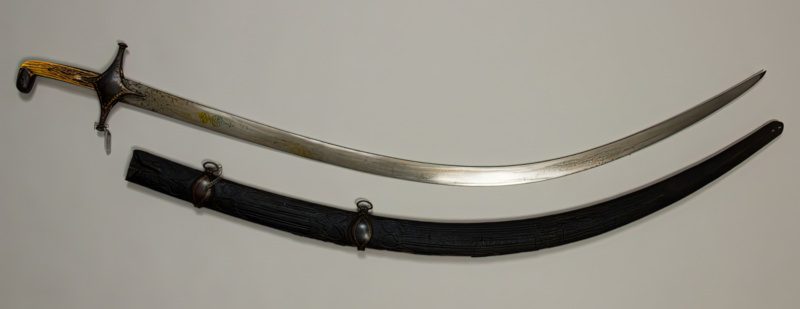
The Shamshir is a Persian sword that is widely recognized for its ridiculously strong curve that starts in the middle of the blade’s length. Because of this curve, it is mostly used as a mounted weapon. More often than not, Damascus steel was used to strengthen the blade.
The most common length of the single-edged Shamshir is 35 to 41 inches (90 to 105 cm). The Shamshir is also the thinnest blade out of all the scimitars.
Kilij
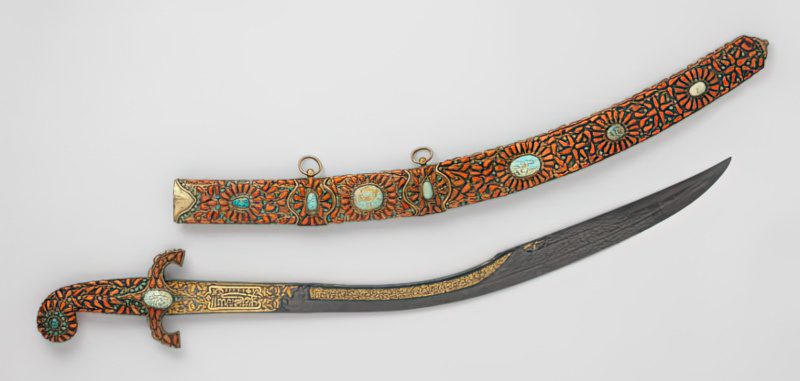
Large parts of eastern Europe, the Middle East, and a big chunk of North Africa were once part of the Ottoman Empire. The Ottoman Empire commonly used a single-edged sword called the Kilij. The Kilij was first used in the 15th century, and it felt like an upgraded version of all the curved Islamic swords having the edge of the blade widened, unlike the Shamshir.
This curve, combined with the very sharp single-edged blade, made it an especially powerful weapon for the Ottoman cavalry. The momentum of the speed of the horse and the widened, heavier tip could easily hack off the heads of enemies.
Just like many of the other scimitars, the Kilij has an L-shaped pommel and a very strong cutting edge. It has an overall size of 27 to 33 inches (68 to 83 cm).
Machete Type Swords

Machetes might just be one of the oldest types of swords that were used by humans. They are essentially an upgrade from the single-edged blades that were used for everyday activities.
Today, almost all machetes are also single-edged and very popular. There are a lot of variations of the machete used around the world. Some examples include the Nepalese Kukri, Philipense Bolo, Ginunting, and so on.
All of these are short swords that utilize their shape for maximum power and deadly strikes by having a razor sharp single-edged blade.
Kukri
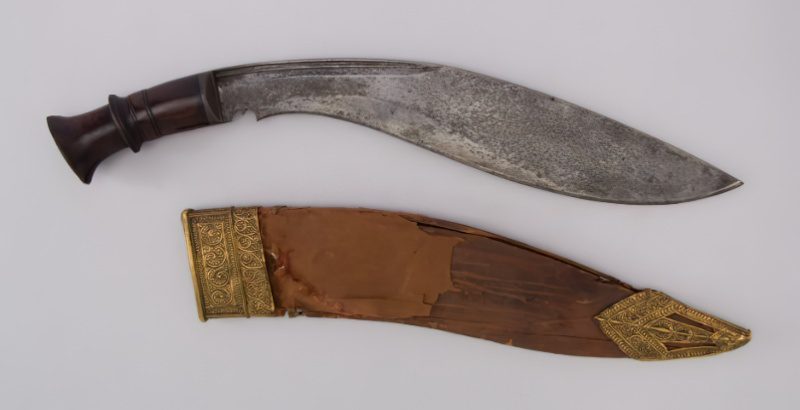
The Kukri is probably one of the world’s most interesting machete types of swords. It is primarily single-edged and relies on the slashing power of the inward curved edge, but at times it has been known to be double-edged too.
Most inward curved blades are single-edged, and people like them for a variety of reasons. The cutting edge of a recurved blade sweeps in and out in a hazy S shape. A recurved blade has a significantly longer cutting edge than a blade of the same length, which makes it better for slashes and lethal cuts.
The length of the Kukri can be from 13 to 19 inches (35 to 50) cm, but there are some that are made larger than this too.
Falcata

The Falcata is an ancient Iberian sword that had a single-edged blade that was sharpened until it could split Roman helmets in two with a single strike. It was so powerful in ancient times that it made the Romans rethink their strategy and armor when attacking or defending.
This Spanish short sword was mainly used for slashing because of its curved shape. It was made so that the center of mass would be closer to the blade’s tip. This added extra momentum when used for hacking, downward motions giving it deadly power.
The Falcata sword is about 24.5 inches (60 cm) long all the way around. Because of this, the Falcata is considered to be a short sword. It is about the same size as other weapons from ancient times, and it is perfect when used together with a shield.
Kopis

The Kopis is the ancient Hellenic sword that was used by the Greek City states and many other lands that were influenced by this powerful-looking sword with a single edge. Some even say that it inspired the Falcata too!
It is a shortsword, just like many other swords of the ancient world, and would mainly be placed on the belt of warriors for secondary use after their pikes or long spears became useless in battle. Even Alexander the Great used it in the conquest of Persia.
Because of its machete-like form, it would sometimes be used as a daily tool and instrument for many different activities. The overall length of this Greek sword was around 25 inches (65 cm), but later versions, like the Macedonian version for example, were shorter and had a blade length of around 19 inches (48 cm).
Messer
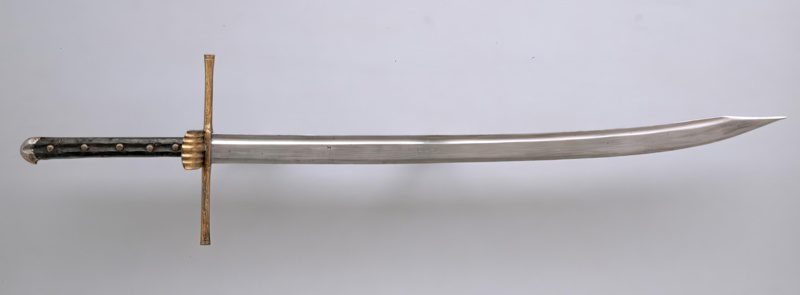
The Messer is a single-edged sword mostly used in medieval Germany and other northern European lands in the middle ages. The Messer is often called a large knife, and we cannot disagree with that since it does in fact look like a very large knife.
The single edge that it has makes it a very powerful slashing weapon that could outdo a double-edged European sword at the time. This extra power made it very popular, and because of its knife status, it was used by both the nobility, city, and regular folk.
Although there are many types of Messer swords, the most commonly used Messer had an overall length of around 30 inches (75 cm).
Backsword

The Backsword is essentially a single-edged longsword. This is a sword that was heavily used throughout the middle ages and renaissance for slashing strikes. Some say it was made because it is stronger with only one sharpened side, while others say that it was simply cheaper to make and maintain.
Whatever the case might be, the Backsword is a straight, single-edged sword and the first European sword with a guard which helped protect the user, making it an easy favorite for common infantry. Its typical length is 39 inches long (100 cm).
Falchion

A Falchion is a European sword used one-handed with one edge sharpened for slashing attacks. The Falchion also had a single-edged blade, but the blade’s tip was double-edged, meaning that it was sharp from both sides.
It was widely used in Europe for its very powerful slashing capabilities. The most regular size and length for the Falchion sword is 37 inches (95 cm) long.
Seax

The Seax is a shortsword or knife that was mainly used by the Germanic people in the Great Migration period for warfare and everyday activities like cooking, cutting rope, grass and more.
It is said that the Vikings used swords and axes a lot, but truth be told, they used a lot of knives like the Seax too. Most of the time, the edge is straight or has a slight curve toward the tip. The back of the blade either curves gently or cuts sharply more toward the tip, which is below the blade’s centerline.
The length of a viking Seax can reach up to 19 inches (50 cm) long, which made some warriors prefer this weapon over the other Viking swords, like the legendary character Grettis from the Grettis Saga, for instance.
Khopesh
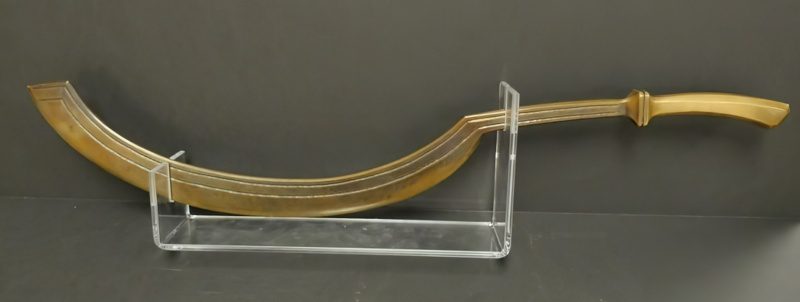
The Khopesh, which can also be said as “khepesh,” is a famous single-edged sickle-shaped sword that dates back to the Bronze Age in Egypt. This is easily the most common weapon somebody thinks of when referring to ancient Egypt.
Some would compare it to a sickle, but there is a big difference due to the fact that the blade of the Khopesh is on the convex side, while the blade of the sickle is on the outer side. This made the weapon only usable for slashing attacks and made it unable to perform thrusting attacks.
This type of weapon had no need for a crossguard because the weird curvature and back edge meant that it was used for fast and deadly strikes. The small size of 21 inches (55 cm) helped wielders perform fast strikes too.
Sumerian Sickle Sword

These curved types of ancient swords were very common during the times of the ancient Sumerians and Assyrians. These swords were pretty much all single-edged and shaped like a sickle.
It most like became a weapon after villagers using it as a tool found it easy to defend themselves and their families with.
They were all very short, spanning from an average length of 19 to 23 inches (50 to 60 cm) meaning that they were mostly used one-handed combined with a shield in the other hand.
Characteristic & Uses of the Single Edged Sword
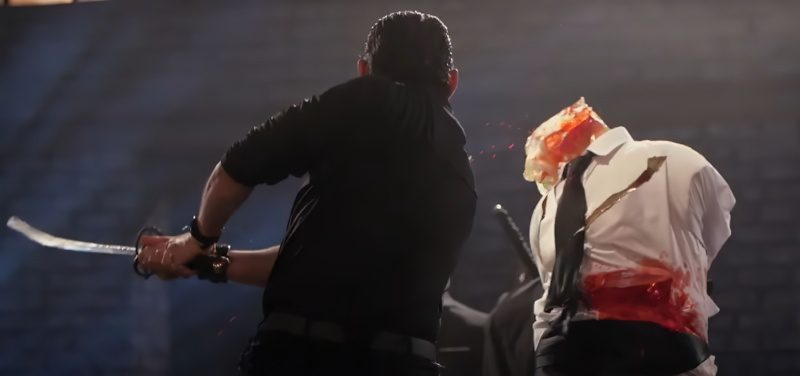
The strongest and main characteristic that is often linked directly to the single edged sword is their curve. Because these types of swords often rely on only one side of the blade to do damage, the curve is made so that it can maximize its slashing potential.
On some single edged swords, this curve might start from the very guard of the sword. While on others, it will start gradually even from the pommel, and curve at a very light angle till the blade’s tip. With that being said, on some swords the curve is very sharp and begins at one part of the blade.
The biggest use for single edged swords are for warfare – both on foot and on a mount. Most of the swords given to the infantry are used both for slashing and thrusting. The curved swords given to cavalry units are mainly for slashing strikes. Other than that, some of them can be used as daily instruments for farming, cutting rope, clearing vegetation, and so on.
Single Edged Sword vs. Double Edged Sword
A single-edged sword does not have two sharpened edges like the double-edged sword. This is the biggest difference between the two swords.
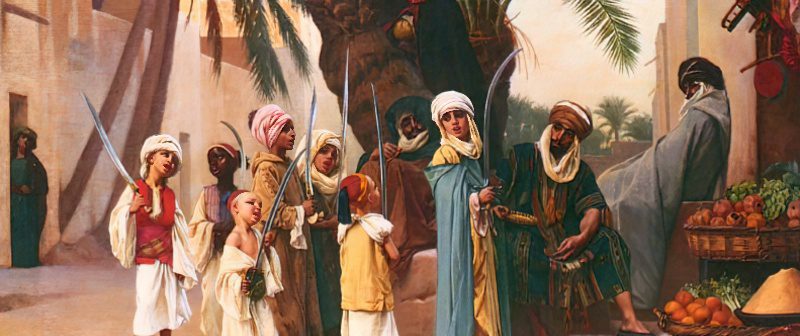
That means that comparing one sword from one group to the other will be like comparing cars, planes, and boats. Each of them has their own beauty and is excellent for some tasks and jobs, while not so good at others.
That is the same case with edged swords. Comparing them would be extremely hard and close to impossible because they are so different from each other.
The closest we can come to comparing them is that single edged swords have a distinctive curve which makes slashing strikes much more powerful. While on the other hand, double edged swords are mostly straight but also very useful for thrusting when combined with a shield or with a line of soldiers.
If you are unsatisfied with that answer, we will place the single edged Katana versus the double edged Longsword. As martial arts and many experienced users of these swords will say, the Longsword is a clear winner. Does this make the double edged swords better? You be the judge.
Conclusion
Single-edged swords gradually replaced double-edged swords due to their superior cutting efficiency. These single-edged swords were used extensively in recent major battles, notably for ambushing unsuspecting riflemen. Today some of the world’s most popular swords are also single edged.




